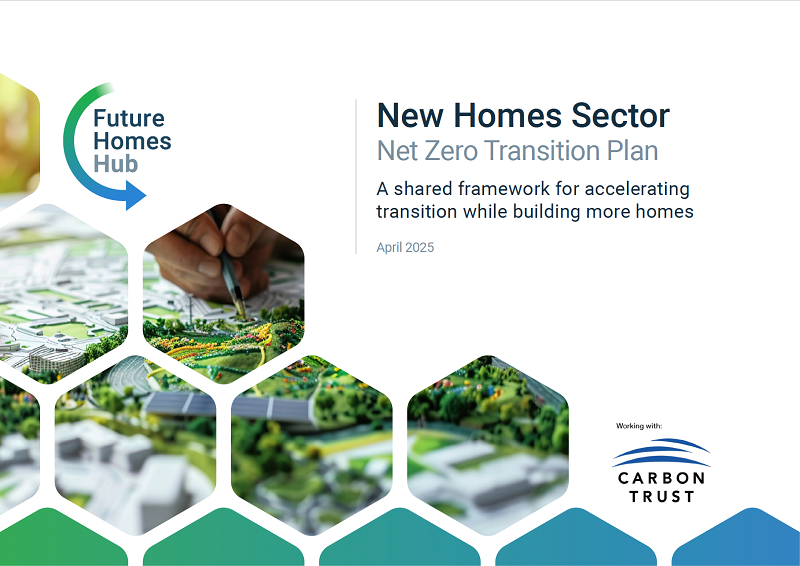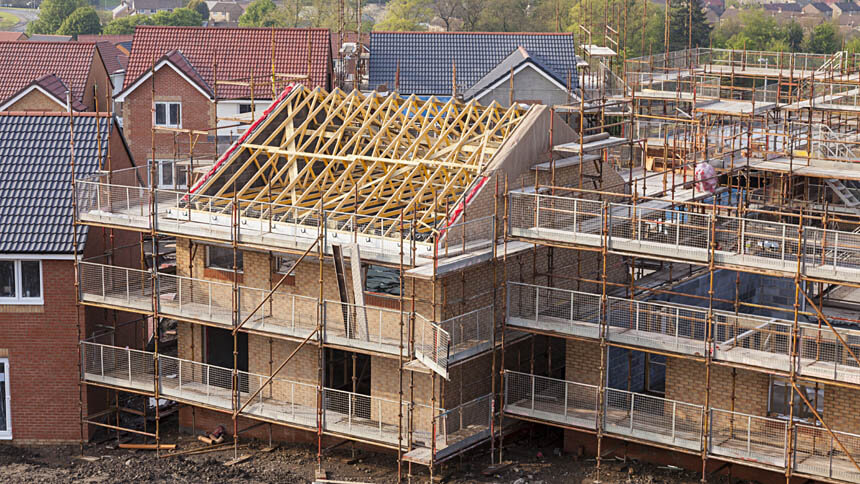The new homes sector has set out its initial Transition Plan as a shared pathway and framework for decarbonising new homes consistent with the Government's carbon budget and housing delivery plans.
The Plan has been developed by the Future Homes Hub and the Carbon Trust drawing on all existing company level plans, the Government’s Carbon Budget delivery Plans, advice from Climate Change Committee and previous work done by non-Government organisations.
All the country’s largest and a cross section of medium and smaller homebuilders have committed to reduce emissions to contribute to sector decarbonisation in line with the Transition Plan.

Companies include: Allison Homes, Bargate, Barratt Redrow, Bellway, Berkeley Group, Bewley Homes, Cala, Carbon Neutral Homes, Cavanna Homes, CG Fry & Son Development, Churchill Living, Clarion Housing Group, Crest Nicholson, Croudace Group, Dandara, Duchy of Cornwall, Durkan Homes, Fairview Homes Homes Ltd, Gleeson, Greencore Homes, The Hill Group, Keepmoat, L&Q, Lioncourt Homes, McCarthy Stone, Miller Homes, Orbit Homes, Persimmon Plc, Places for People, Platform Housing Group, Strata, Taylor Wimpey, Thakeham, VerdeGo Group and Vistry Group.
The purpose of the plan is to provide homebuilders, materials manufacturers and suppliers, contractors, trades, financial institutions, central Government and local Government with a shared pathway and framework to align around and to work together on overcoming barriers. By involving homebuilders in its development, the plan also reflects housing growth plans and the opportunities to make new homes more comfortable and cheaper to run as we decarbonise the way we build.
The initial estimate of the baseline emissions from the new homes sector is just under 50 million tonnes per annum in total made up of:
- 39% from the operation of new homes
- 6% from the construction process
- 50% from construction products
- 5% from head office, staff and other emissions
The plan sets out a pathway for reducing those emissions through nine emissions reduction levers:
1. Operational decarbonisation through the Future Homes Standard
2. Smart controls and energy storage
3. Fuel switching and plant decarbonisation
4. Generator/compound energy saving
5. Design for low embodied carbon and alternative materials
6-9. Reduce emissions from concrete, steel, bricks and other materials.
The sector will collaborate to support delivery of these actions through two bodies administered by the Future Homes Hub:
- The Future Homes Implementation Board, which is co-chaired by MHCLG and Matthew Pratt at Barratt Redrow
- The Embodied Carbon Implementation Board which will bring homebuilders, materials suppliers, Government Departments and other stakeholders together to drive reduction of embodied carbon.
The Future Homes Hub will also work with the Government’s Net Zero Council, co-chaired by the Government’s Energy Secretary, to coordinate with decarbonisation in other sectors.
The Future Homes Hub is developing metrics which companies will report on to track progress. In 2026, the plan will be updated to ensure the sector remains on track for net zero as the wider landscape changes. An important focus of the plan is to help make decarbonisation simple and cost effective for smaller homebuilders and further guidance will be provided.
The Future Homes Hub invites continued input from stakeholders and will issue an updated transition plan later this year, incorporating refined data and improved assumptions to support the journey towards net zero. For more information about the Plan, please visit: Current Future Homes Hub Project - Net Zero Transition
David Thomas: Chair of the Future Homes Hub and Chief Executive of Barratt Redrow said: “For the UK to transition successfully to clean energy, building a generation of high quality, comfortable and affordable homes, government and the homebuilding sector need to unite behind one plan.
“We must commit to collaborate and share lessons from innovation and trials, as well as larger companies helping to create markets for low carbon products at the scale required to bring down cost. The whole new homes supply chain must work with us to play their part in achieving this transition plan.”
John Palmer, Deputy Director of New Build Standards and Performance, MHCLG said: “Reducing embodied carbon in the built environment is essential for achieving net zero targets. The Hub’s excellent work over recent years to make sure industry understands and is ready for net zero speak for themselves. An industry-wide approach like this can help developers understand and manage embodied carbon, enabling them to make the necessary changes.”
Ryan McLaughlin, Director of Net Zero Strategy, DESNZ said: “Accelerating to net zero will unlock a range of benefits for businesses, including new market opportunities, access to green finance and reduced energy bills. Businesses, in turn, have a vital role to play and that is why sector roadmaps are so important - they help to guide the transition plans of individual companies, provide clear signals to investors and focus policymakers on priorities. Government is committed to working in partnership to support the business community in delivering their plans.”




















